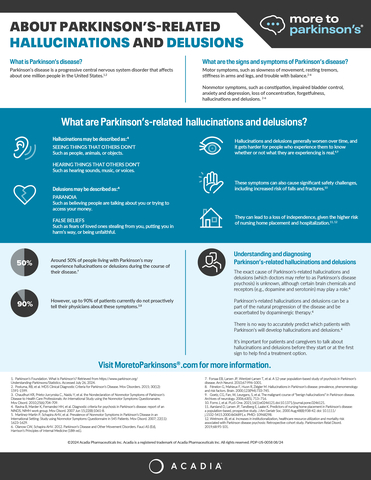SAN DIEGO--(BUSINESS WIRE)--Ryan Reynolds, a world-renowned actor/entrepreneur and Parkinson’s disease advocate, with Acadia Pharmaceuticals Inc. (Nasdaq: ACAD) today announced the launch of a multi-faceted disease education campaign, More to Parkinson’s®, to raise awareness among caregivers, patients and their care providers about a common, yet under-recognized aspect of Parkinson’s disease – Parkinson’s-related hallucinations and delusions.
Notably, around half of the people living with Parkinson’s disease may develop hallucinations or delusions over the course of their disease, but up to 90% of people currently do not proactively tell their physicians about these symptoms.1-3 By sharing their experiences caring for Ryan’s father, James “Jim” Reynolds, who passed away nearly a decade ago, Ryan and his mother Tammy, aim to raise awareness, educate and drive conversation between people with Parkinson’s disease, their families and their doctors about how best to talk about and treat these non-motor symptoms.
“My father experienced hallucinations and delusions. At the time, we didn’t know any of these types of symptoms were part of his Parkinson’s disease,” Reynolds explains. “Like a lot of caregivers, my mom mostly tried to carry these burdens alone. I wish I’d known Parkinson’s disease wasn’t limited to only motor symptoms. I think people and families affected by Parkinson’s can be better prepared to manage hallucinations and delusions if they’re talking early and often about this lesser-known aspect of the disease.”
This press release features multimedia. View the full release here: https://www.businesswire.com/news/home/54103329/en.
“In my experience, most people living with Parkinson’s disease who experience hallucinations and delusions do not proactively tell their physicians about them unless specifically asked,” explains Dr. Yasar Torres-Yaghi, attending physician, director of Parkinsonism and Dementia Clinic at Georgetown University Hospital, Washington, D.C., a Parkinson’s Center of Excellence. “They may be frightened, embarrassed, or fear they are losing touch with reality. It’s important for people who are living with Parkinson’s and their loved ones to discuss all symptoms, motor and non-motor, with a doctor as there are treatment options available.”
More to Parkinson’s is an educational campaign, sponsored by Acadia Pharmaceuticals Inc., that aims to increase awareness among caregivers and patients of the existence of hallucinations and delusions as common parts of Parkinson’s disease. The campaign is anchored by a series of stories shared by Ryan and his mother, Tammy, as they relay their personal experiences from the perspective of a son and caregiver as well as a wife, mother, and caregiver, over the course of Jim’s disease. The multichannel campaign includes videos spanning a wide range of topics focusing on Parkinson’s-related hallucinations and delusions, covering who is at risk, what symptoms may look like, how to discuss symptoms and treatment options with a doctor, and more. The campaign will strive to reach the Parkinson’s disease community through digital media, social media and connected TV.
“There is a significant gap in awareness and understanding that hallucinations and delusions can be part of the progression of Parkinson’s disease,” said Steve Davis, Chief Executive Officer, Acadia. “As Ryan’s family story makes evident, the non-motor symptoms of Parkinson’s, including hallucinations and delusions, are often more distressing and disruptive than the motor symptoms associated with the disease. We are honored that Ryan and Tammy are willing to share their powerful story. Their experiences will open the door to desperately needed conversation and encourage people to speak with their healthcare providers about managing these symptoms.”
To learn more, visit MoretoParkinsons.com to find resources, including doctor and family discussion guides, and hear stories from people who have been affected by Parkinson’s-related hallucinations and delusions.
About Parkinson’s Disease and Parkinson’s-Related Hallucinations and Delusions
Parkinson’s disease is a progressive nervous system disorder that affects about one million people in the United States.4,5 The signs and symptoms can vary with people experiencing both motor symptoms and non-motor symptoms such as hallucinations (seeing, hearing, or experiencing things that others don’t) and delusions (false beliefs). Physicians may refer to these Parkinson’s-related hallucinations and delusions as Parkinson’s disease psychosis.3,6,8 Around 50 percent of people living with Parkinson’s disease may experience hallucinations or delusions during the course of their disease.1 Non-motor symptoms, as a whole, can be more troublesome than motor symptoms, in terms of quality of life.3 Parkinson’s disease psychosis may add to the burden of caring for a loved one with Parkinson’s disease.9-11
About Acadia Pharmaceuticals Inc.
Acadia is advancing breakthroughs in neuroscience to elevate life. For 30 years we have been working at the forefront of healthcare to bring vital solutions to people who need them most. We developed and commercialized the treatment options for people living with hallucinations and delusions associated with Parkinson’s disease and Rett syndrome. Our clinical-stage development efforts are focused on treating, Prader-Willi syndrome, Alzheimer’s disease psychosis and multiple other programs targeting neuropsychiatric symptoms in central nervous system disorders. For more information, visit us at Acadia.com and follow us on LinkedIn and Twitter.
References
1 Forsaa EB, Larsen JP, Wentzel-Larsen T, et al. A 12-year population-based study of psychosis in Parkinson disease. Arch Neurol. 2010;67(8):996-1001.
2 Fénelon G, Mahieux F, Huon R, Ziégler M. Hallucinations in Parkinson’s disease: prevalence, phenomenology and risk factors. Brain. 2000;123(Pt 4):733-745.
3 Chaudhuri KR, Prieto-Jurcynska C, Naidu Y, et al. The nondeclaration of nonmotor symptoms of Parkinson’s disease to health care professionals: an international study using the nonmotor symptoms questionnaire. Mov Disord. 2010;25(6):704-709.
4 Parkinson’s Foundation. What is Parkinson’s? Retrieved from https://www.parkinson.org/Understanding-Parkinsons/Statistics. Accessed March 1, 2024.
5 Marras C, Beck JC, Bower JH, et al.; Parkinson’s Foundation P4 Group. Prevalence of Parkinson's disease across North America. NPJ Parkinsons Dis. 2018 Jul 10;4:21.
6 Ravina B, Marder K, Fernandez HH, et al. Diagnostic criteria for psychosis in Parkinson’s disease: report of an NINDS, NIMH work group. Mov Disord. 2007 Jun 15;22(8):1061-8.
7 Martinez-Martin P, Schapira AHV, et al. Prevalence of Nonmotor Symptoms in Parkinson’s Disease in an International Setting: Study using Nonmotor Symptoms Questionnaire in 545 Patients. Mov Disord. 2007; 22(11): 1623-1629.
8 Olanow CW, Schapira AHV. 2012. Parkinson’s Disease and Other Movement Disorders. Fauci AS (Ed), Harrison’s Principles of Internal Medicine (18th ed.).
9 Martinez-Martin P, Rodriguez-Blazquez C, et al. The Impact of Non-Motor Symptoms on Health Related Quality of Life of Patients with Parkinson’s Disease. Mov Disord. 2011;26(3):399-406.
10 Aarsland D, Bronnick K, Ehrt U, et al. Neuropsychiatric symptoms in patients with Parkinson’s disease and dementia: frequency, profile and associated care giver stress. J Neurol Neurosurg Psychiatry. 2007;78:36-42.
11 Schrag A, Hovris A, et al. Caregiver-burden in parkinson’s disease is closely associated with psychiatric symptoms, falls, and disability. Parkinsonism and Related Disorders. 2006;12:35-41.







